UC Berkeley Point of View
What does the Free Speech Movement mean to you? Is its spirit still alive at Berkeley?
BERKELEY – On October 1, 1964, hundreds of students surrounded a police car on Sproul Plaza and prevented it from driving off with former Cal graduate student Jack Weinberg, a civil rights organizer who had violated the campus's ban on political advocacy. The police-car incident was followed by several weeks of tumultuous protests, rallies, and sit-ins, and it was the beginning of something much, much bigger. The Free Speech Movement shook the nation.
| A thousand points of view "Point of View" is a highly unscientific snapshot of responses to questions — some serious and some not — gathered around campus. The opinions expressed do not represent the university's position on a topic. Rather, they illustrate the diversity of viewpoints found at UC Berkeley. (Check out the Point of View archive.) |
Forty years later, the movement's most visible legacy here is not the small plaque in front of Sproul Hall commemorating where FSM leader Mario Savio stood, but the tables manned by students offering information on everything from the Socialist Worker newspaper to the Asian Baptist Student Association. Shortly before the 40th anniversary festivities began, the NewsCenter roamed around and asked a few people what, if anything, the Free Speech Movement meant to them. The answers may surprise you.
Want to learn more about the events, players, and consequences of the Free Speech Movement? The Free Speech Movement Archive and the Bancroft Library's FSM project offer a wealth of resources such as this collection of narratives.
 |
'I think it's still alive, but more in Berkeley the
community than Berkeley the university. A lot of the residual elements
are still there, like People's Park, and many of the people who were
involved are still around on Telegraph Avenue. On campus, student groups
still meet and share information on Sproul, and it's cool to be able
to go into the Free Speech Movement Café and see the pictures
of those times. However, the university doesn't try that hard to promote
free speech anymore. Anytime you try to organize anything, you hear
about how you'll be disrupting this and that and you can't do it. And
if you're not a registered student group, you can forget about setting
up a table on Sproul.' —Toff Peabody,
2004 graduate in molecular and cell biology and political science
and would-be graduate student. Hometown: Alpine, CA |
| 'The impression I have always had of the Free Speech
Movement is that its legacy has been overexaggerated. From people I've
talked to who went to Berkeley in the 1960s, it was just about protests
in order to be able to print swear words in the newspaper. Still, I
think the 40th anniversary is a good time for reflection, a time to
look at, say, corporate sponsorship of our scientific research and
what kind of influence it might be having.' —Jodie Mendelson, fourth-year
architecture major and conservation research studies minor. Hometown:
Valencia, CA. |
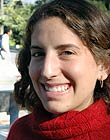 |
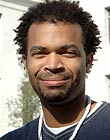 |
'The movement means more to people who were around
then and who helped facilitate it. For students now, free speech is
a given. It's the foundation that has been laid for us, and we take
it for granted. It's definitely not in the forefront of people's awareness
on campus.' —Michael Hunter, fifth-year sociology
major and education and philosophy minor. Hometown: Inglewood, CA. |
| 'Honestly, I don't know much about the Free Speech
Movement at all, just bits and pieces. I've heard a lot of stories
that I don't think are true. I think I speak for most of the girls
in my sorority when I say we'd be interested in learning more about
it.' —Joy Chang, third-year intended
English and political science major. Hometown: Roland Heights, CA. |
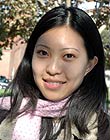 |
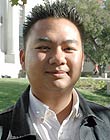 |
'It's such a historical part of Berkeley that nowadays
I think some people take it for granted. They're not aware of how
much
it took for us to have the free speech we enjoy today. It's a freedom
a lot of people in the world don't have. I've lived in a foreign
country
where there is censorship and I know what it's like to have to read
between the lines all the time. There is still free speech at Berkeley.
You can sit here on Sproul and on one end a guy is playing guitar and
on the other end a man is playing Chinese music and in between a
bunch
of students are protesting the war. That is so Berkeley. Free speech
is just part of the atmosphere here.' —Tan Tmangraksat, fourth-year Political
Economy of Industrial Societies (PEIS) major. Hometown: Los Angeles
by way of Bangkok. |
| 'I haven't heard that much about it. We did get one
notice about the anniversary coming up, and one of my professors mentioned
it in class, how it happened and all, but that's about it. I think
it's great that it's being celebrated, but I wish I knew more about
why we were celebrating it. Compared to where I came from, Berkeley
is pretty liberal. But you still can't just say whatever you want here
and not think there will be consequences.' —Mayra Ceja, second-year
undeclared major. Hometown: Merced, CA. |
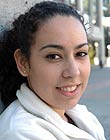 |
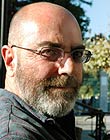 |
'Whether the spirit is alive or not I don't really
know, but I do think it established a threshold from which we all benefit
today. The benefit is a negated fear of self-expression. It is, however,
taken for granted somewhat. I graduated from Cal in 1970 and have worked
at the university for 35 years. There have been a lot of changes in
that time. My impression is that the current student body is more conservative
than in past decades.' —Jim Govek, Financial Aid Office analyst.
Hometown: Berkeley by way of San Jose, CA. |
| 'As an international student, it means a lot to me.
I think it's one of the biggest reasons that Berkeley is so famous
worldwide. The fame that the Free Speech Movement has won for Berkeley
is a big attraction for international students, and it separates it
from the other UC campuses. To me, its legacy is in the idea here that
learning is also about taking action to change things, to make things
better in the world. But whether the spirit of the movement is still
alive is a controversial question, given that the university took disciplinary
action last year against students who were merely expressing their
opinions. That is troubling to me. Still, Berkeley is still one of
the most active campuses in the world.' —Mona El Sherif, Near Eastern
Studies graduate student. Home country: Egypt. |
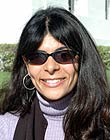 |
